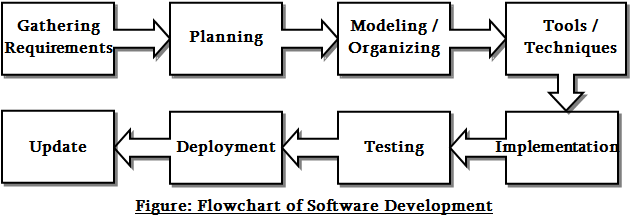The purpose of software engineering is to build, test, and maintain software systems in a systematic and disciplined way. By applying engineering principles and techniques to software development, it is aimed at creating high-quality, reliable, and maintainable software systems that fulfill stakeholders’ demands and requirements.
Many steps are included in the software engineering process, including:
In order to design a software system, stakeholders need to be consulted to identify and understand their needs and requirements.
This requirements collecting and analysis comprises identifying the modules, components, and interfaces of the system and establishing their behavior.
The design process of generating a blueprint or plan for a software system.
The third phase in software development is coding, which includes generating code that implements the concept.
In testing, the software system is examined to verify that it satisfies the requirements and functions as intended.
The maintenance of software systems entails adding new features, fixing faults, and enhancing performance after they are introduced.

It is critical that all phases in program engineering be documented, from requirements collecting through deployment, so the program can be understood, altered, and maintained in the future.
Managing resources, scheduling tasks, and monitoring progress are all critical components of efficient project management to guarantee the software is created on time, within budget, and to the acceptable quality standards.
Quality assurance is implementing techniques and processes that promote quality at every level of the development process, quality assurance assures that the software fulfills the desired quality standards.
There are numerous components that make up software engineering, and their relative significance may alter based on the unique circumstances in which the software system is produced. In addition to technical talents, effective software engineers require outstanding communication, teamwork, and problem-solving ability, as well as a thorough awareness of the business context.

